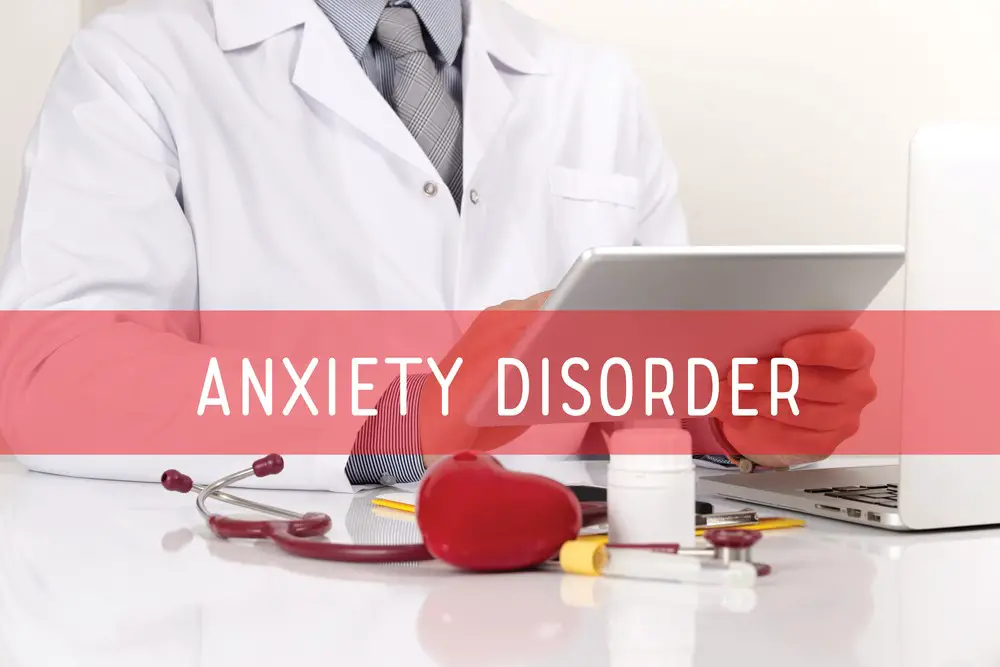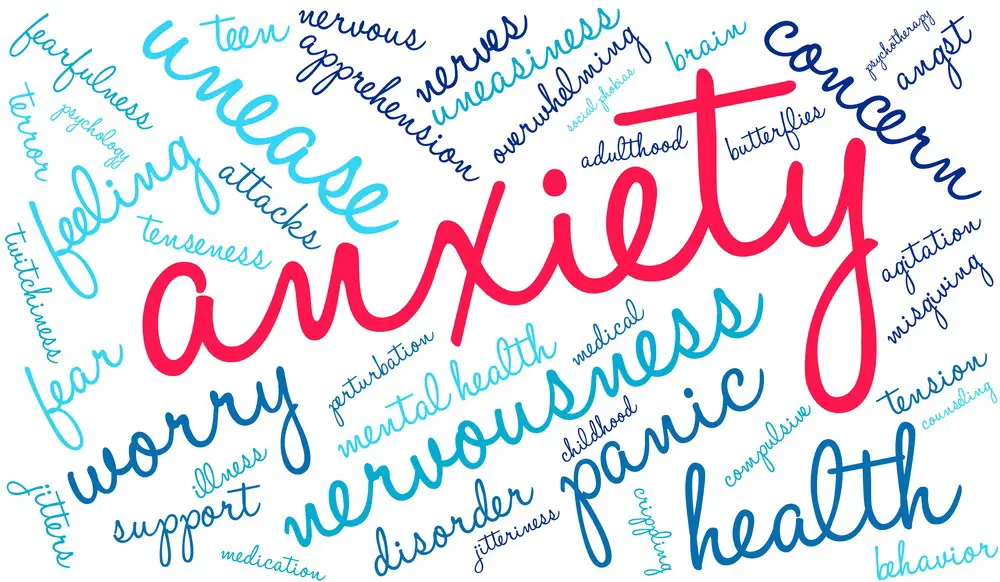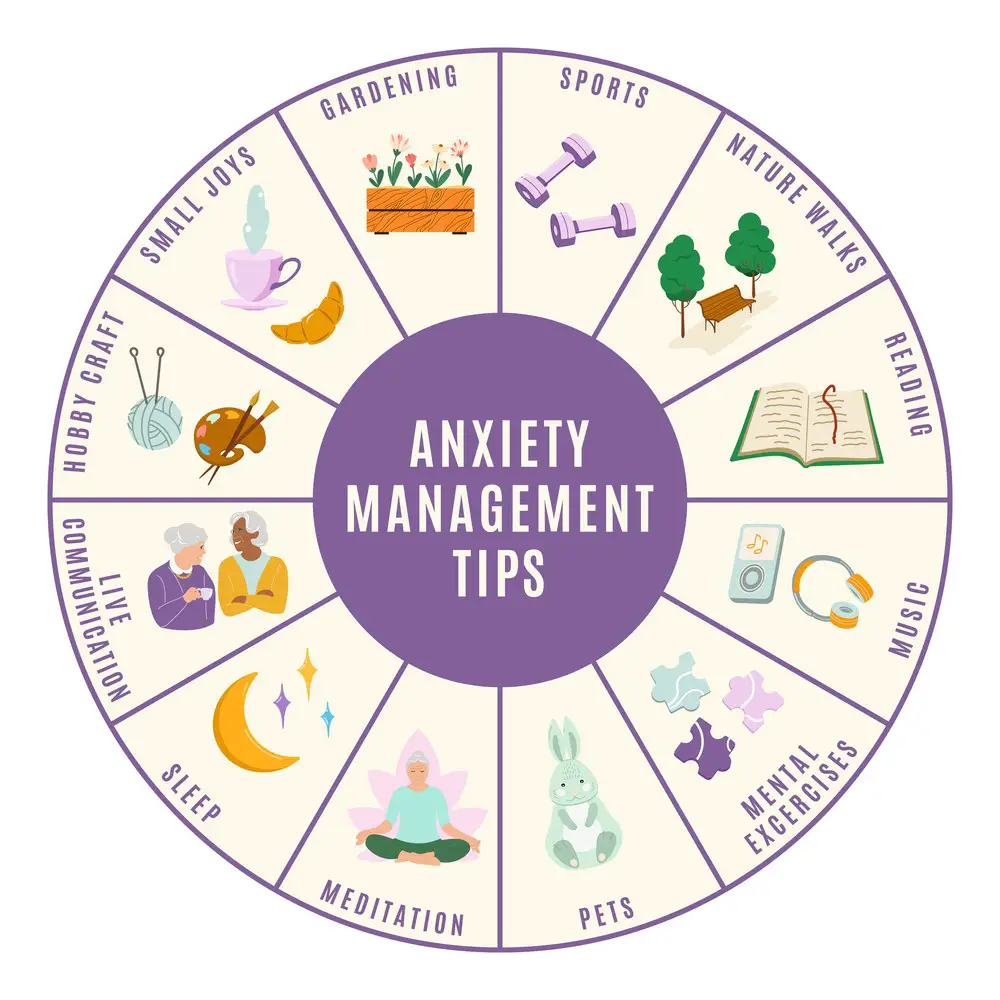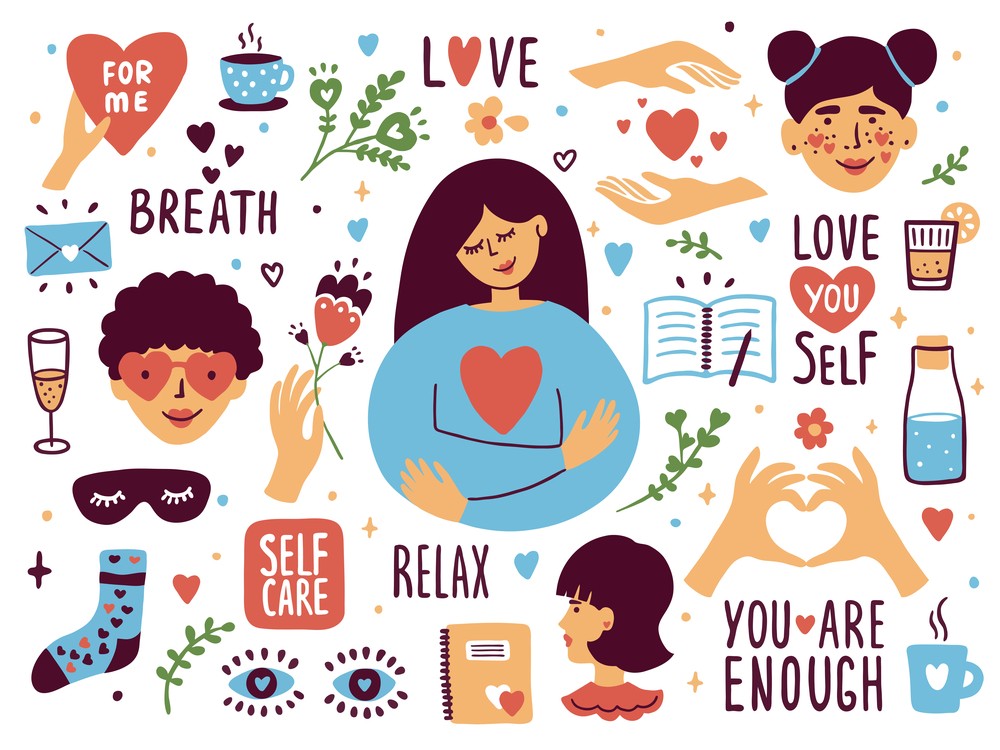As a BetterHelp affiliate, we receive compensation from BetterHelp if you purchase products or services through the links provided
Marriage is a beautiful bond, but it can have its fair share of challenges. Anxiety can be a common issue that couples may face, particularly when the wife is the one experiencing it. By understanding the complexities of anxiety and its impact on their relationship, couples can work together to find solutions and strengthen their connection.
Anxiety affects people differently, and it can become overwhelming if not addressed. It’s important to recognize the signs, triggers, and challenges associated with anxiety. In a marriage, anxiety can stress both partners immensely, leading to misunderstandings, tension, and emotional strain. By examining specific challenges faced by both the wife and the husband, couples can better understand each other and learn how to provide necessary support.
Key Takeaways
- Recognize the signs and triggers of anxiety in a marriage
- Understand specific challenges faced by both the wife and the husband
- Address anxiety issues with professional help, self-care, and creating a safety plan
 Understanding Anxiety
Understanding Anxiety
Experiencing anxiety is a natural part of life; it’s your body’s response to stress or perceived danger. However, when anxiety becomes persistent and interferes with daily activities, it may indicate an anxiety disorder. This section will help you better understand anxiety and its impact on relationships, particularly within a marriage.
Generalized Anxiety Disorder (GAD) is one of the most common types of anxiety disorders. People with this disorder experience excessive worry, even without apparent cause. The constant overthinking and anxiety can take a toll on one’s personal life, especially their marriage. You may always be anxious about your partner’s well-being, the future, or other seemingly trivial matters.
Recognizing anxiety symptoms can help you and your spouse address the issue more effectively. Common symptoms of anxiety include:
- Restlessness or feeling on edge
- Irritability
- Sleep disturbances
- Difficulty concentrating
- Rapid or irregular heart rate
- Shortness of breath
Fear and anxiety are distinct but interrelated emotions. Fear typically stems from a specific, objective threat, while anxiety is usually linked to a vague, subjective one. In a marriage, it’s essential to differentiate between these two emotions and address them accordingly.
To better navigate anxiety within your marriage, consider the following tips:
- Educate yourself and your spouse about anxiety disorders to foster understanding and empathy.
- Encourage open communication between you and your partner about your emotions and worries.
- Seek professional help, such as therapy or counseling, for guidance and support.
- Develop healthy coping mechanisms, like exercise, meditation, and hobbies, to help manage stress and anxiety.
Key takeaway: Understanding the nature of anxiety, recognizing its symptoms, and differentiating between fear and anxiety can help you and your spouse better manage the challenges of an anxiety disorder. Implementing effective coping strategies and maintaining open communication are crucial to nurturing a healthy and loving relationship.
 Anxiety Impact on Marriage
Anxiety Impact on Marriage
Anxiety can have a significant impact on your marriage and overall relationship. When one partner constantly feels worried or stressed, this can create an emotional barrier between both parties. Here are some ways anxiety may affect your marriage:
- Emotional distance: Anxiety can cause you to withdraw emotionally from your spouse, making it difficult to maintain a strong connection with them. It might feel like you are always preoccupied with your thoughts, preventing you from fully engaging with your partner.
- Miscommunication: When anxiety takes over, expressing your emotions and thoughts becomes challenging. This can lead to frequent misunderstandings between you and your partner, which can further strain the relationship.
- Increased stress: Anxiety affects the person experiencing it and the people around them. When one partner constantly worries, it can create a tense environment, increasing stress levels for both individuals.
- Negative impact on intimacy: Anxiety can alter your mood, making it difficult to create the emotional and physical closeness necessary for a healthy, intimate relationship. This can lead to less affection and sexual dissatisfaction.
- Character changes: Chronic anxiety may lead to you adopting unexpected behaviors, such as irritability, restlessness, or shutting down emotionally. These character changes can make it difficult for your partner to relate to and understand you.
Here are a few helpful tips to tackle anxiety and improve your marriage:
- Open up about your anxiety: Have honest conversations with your partner about your feelings and concerns. This can help create a shared understanding and enable your spouse to provide support when needed.
- Seek professional help: If anxiety significantly affects your relationship, consider seeking therapy or counseling, individually or as a couple.
- Practice self-care: Prioritize your mental and emotional well-being through self-care activities such as exercise, eating well, and establishing a consistent sleep routine.
- Work on communication: Make a conscious effort to communicate with your partner regularly and effectively. This can help you better express your thoughts and emotions and improve your connection.
- Develop coping strategies: Develop tools and techniques to help you manage your anxiety, such as mindfulness exercises, deep breathing, or journaling.
Remember that overcoming anxiety is a journey; working collaboratively with your partner to find solutions and create a stronger, healthier relationship is essential.
 Specific Challenges for the Wife
Specific Challenges for the Wife
Experiencing anxiety can be overwhelming, and when it starts to affect your marriage, it’s essential to address the specific challenges you might face as a wife.
Worry and Fear: As a wife with anxiety, you may constantly worry about your relationship and fear that something is going to go wrong. These thoughts can be paralyzing and lead to endless rumination, making it difficult to focus on the present and enjoy your time with your spouse.
Panic: Anxiety can trigger unexpected panic attacks. During these episodes, you may experience extreme discomfort, palpitations, and a sense of losing control. These moments can be difficult for you and your partner, as they might not fully understand what’s happening or how to help.
Depression: Anxiety and depression often go hand-in-hand. You may feel hopeless or overwhelmed by your anxiety, which can lead to a depressive state. This may result in withdrawing from your partner, creating an emotional distance between you two.
Restlessness: As your anxiety intensifies, you might struggle with restlessness and irritability. This can make it challenging for you to relax and feel at ease with your spouse, impacting your quality time together.
Guilt: It’s common for wives with anxiety to feel guilty about the strain their condition may put on the marriage. You might worry that you’re a burden to your partner or that they would be happier without you.
To help you manage these challenges, consider:
- Communicating openly with your spouse about your feelings, fears, and experiences with anxiety.
- Seeking professional help, such as therapy or counseling, to work on identifying and addressing the root causes of your anxiety.
- Practicing relaxation techniques, like meditation or deep breathing exercises, to help manage stress and anxiety symptoms.
- Encouraging your spouse to learn more about anxiety so they can better understand and support you.
- Remember that it’s essential to take care of yourself, both mentally and physically, to contribute to the well-being of your marriage.

Specific Challenges for the Husband
Dealing with a wife’s anxiety can be challenging for a husband, but understanding the nuances of her struggles can help you support her better. Here are some specific challenges you may face:
1. Listening: Ensure you actively listen to your wife when she shares her concerns and emotions. This means not interrupting, making eye contact, and asking questions for further understanding. Showing her you care may make her more comfortable opening up to you.
2. Empathy: It can be difficult to put yourself in your wife’s shoes and truly empathize with her anxiety. However, making an effort to understand her feelings and thought patterns will help build trust and allow her to feel more secure when sharing her experiences.
- Develop your empathy skills by reading books on the subject or even attending therapy sessions together.
3. Avoid Trying to Fix the Problem: As a husband, you may feel compelled to find a solution to your wife’s anxiety. While it’s natural to want to alleviate her stress, trying to “fix” the issue may lead to frustration and disappointment, as anxiety is often multifaceted and requires professional intervention.
- Focus on offering reassurance, love, and encouragement instead of unsolicited advice.
4. Clarity: Communicating openly and honestly with your wife about her anxiety is important. Ensure you understand each other’s feelings, thoughts, and concerns. Clarity in conversations is the key to a healthy and supportive relationship.
- Practice active and reflective listening to ensure that both parties are fully understood.
5. Supporting Your Wife in Seeking Professional Help: It’s crucial to encourage your wife to seek therapy or counseling if her anxiety is impacting her daily life and your marriage negatively.
- Research counselors or therapists together, or offer to attend sessions with her for added support.
By paying attention to these specific challenges, you can navigate the complexities of your wife’s anxiety journey as a husband and foster a supportive, empathetic, and understanding environment for your relationship.
 How Anxiety Triggers Can Affect the Marriage
How Anxiety Triggers Can Affect the Marriage
Anxiety triggers can significantly impact the dynamics of your marriage, as they can bring about unwanted behavioral and emotional changes. Recognizing how these triggers influence your relationship is crucial to maintaining a healthy bond with your spouse.
When anxiety triggers manifest, the body’s natural response, often called the fight-or-flight response, kicks in. This biological reaction is meant to protect us from danger, but in the case of an anxious spouse, it can strain your marriage. Your partner might become irritable, defensive, or overly protective. To prevent these reactions from affecting your marriage, try:
- Identifying the triggers: Being aware of what causes anxiety in your spouse can help you minimize the occurrence of these situations. Discuss openly with your partner and learn the situations, thoughts, or events that provoke their anxiety.
- Building a supportive environment: Show empathy and understanding when your spouse is anxious. Encourage open communication and provide reassurance. This will help you both feel closer and more connected.
- Maintaining a balanced lifestyle: Stressful schedules, lack of sleep, and poor nutrition might contribute to amplified anxiety. Maintaining a balanced lifestyle can help reduce anxiety symptoms and improve your relationship.
Dealing with anxiety in your marriage is difficult, but remaining patient and understanding can make a world of difference. Hold on to the love and support that initially brought you together, and you will both be better equipped to navigate this challenge. Use these tips and strategies to conquer the impact of anxiety triggers and foster a healthier relationship with your spouse.
 Seeking Professional Help
Seeking Professional Help
When your wife’s anxiety affects your marriage, seeking professional help is crucial. A therapist can provide guidance and support to help you navigate this challenging situation.
A couples therapist can be highly beneficial in identifying the root causes of anxiety and addressing its impact on your relationship. They can help you and your wife understand each other’s needs and emotions and develop effective coping strategies.
As you explore therapy options, consider the following types of professionals who specialize in mental health:
- Therapist: Provides emotional support and helps develop coping strategies for anxiety
- Psychologist: Trained in diagnosing and treating mental health disorders, including anxiety
- Psychiatrist: A medical doctor who specializes in mental health and can prescribe medication if necessary
In addition to attending couples therapy, your wife must seek individual treatment for her anxiety. This may include one or more of the following:
- Psychotherapy: A common form of therapy that helps identify and change negative thought patterns
- Cognitive-behavioral therapy (CBT): Focuses on understanding and changing the thoughts and behaviors that contribute to anxiety
- Medication: Prescribed by a medical professional to help manage symptoms
Remember, seeking professional help doesn’t mean your marriage is failing. It shows your commitment to improving your relationship and supporting your partner as they manage their anxiety. With patience, understanding, and the help of mental health professionals, your marriage can navigate these challenges and grow stronger.
 Practicing Self-Care and Love
Practicing Self-Care and Love
Taking care of yourself is crucial when dealing with anxiety, especially when it’s affecting your marriage. By practicing self-care and embracing self-love, you can become more grounded, resilient, and better equipped to communicate with your partner. Here are some practical steps to incorporate self-care and love in your daily life:
- Establish a self-care routine: Set aside dedicated time daily to focus on yourself, whether it’s a long walk, a warm bath, or engaging in a hobby you enjoy. This can help you recharge your energy and create a healthy balance in your life.
- Invest in self-care resources: Numerous books and online resources are available to guide you on your self-care journey. Explore a variety of self-help books, podcasts, and workshops to gain new insights and techniques for managing anxiety and nurturing self-love.
- Prioritize your physical and mental health: Make sure you’re eating well, exercising regularly, and getting enough sleep. Additionally, consider seeking professional help or engaging in mindfulness practices like meditation, yoga, or deep breathing exercises to address your emotional well-being.
- Cultivate a support network: Reach out to friends or support groups where you can discuss your experiences, gain valuable insights, and receive encouragement from others going through similar situations.
- Focus on self-love: Accept and appreciate your strengths, flaws, and accomplishments. Practice positive self-talk and challenge negative thoughts that may arise due to anxiety. Surround yourself with positive influences and affirmations.
Here are some valuable self-care tips for you to consider:
- Make a list of things that bring you joy and schedule them in your calendar
- Give yourself permission to take breaks and set healthy boundaries
- Identify your stressors and develop strategies to cope with them
- Remember to celebrate your achievements, no matter how small they may seem
As you continue to nurture self-care and love, you’ll improve your relationship with yourself and your spouse. Remember, self-care is a journey that requires time, patience, and constant attention. By investing in yourself, you’re creating an environment where both you and your marriage can thrive.
 Creating a Safety Plan
Creating a Safety Plan
Creating a safety plan is crucial for navigating your wife’s anxiety and preventing it from damaging your marriage. A comprehensive plan will enable you to establish a supportive environment and address any potential anxieties in a controlled manner. Here are some key steps to build a solid safety plan:
- Identify triggers: Recognize the situations, experiences, or environments exacerbating your wife’s anxiety. This understanding will help you better anticipate and avoid these triggers.
- Develop coping strategies: Collaborate with your wife to determine effective coping mechanisms when anxiety arises. These may include breathing exercises, meditation, or grounding techniques.
- Establish a support system: Encourage your wife to seek professional help, such as therapy or counseling. Contact trusted friends or family members, and consider attending support group meetings for spouses dealing with anxiety-related issues.
- Set boundaries: Establishing healthy boundaries for both of you is essential. Define which responsibilities you will each take on and which aspects of your life the anxiety should not be allowed to infiltrate.
- Foster open communication: Encourage honest and open conversations about your feelings, fears, and expectations. Make sure both of you feel comfortable expressing your thoughts and concerns without judgment.
By following these steps, you can create a safety plan that promotes support and reduces the impact of anxiety on your marriage. Remember, it is important to approach this process with empathy, patience, and a willingness to adapt to the unique challenges that each new situation may bring.
 Navigating the Storm: A Compass for Couples Weathering the Waves of Anxiety Together
Navigating the Storm: A Compass for Couples Weathering the Waves of Anxiety Together
Anxiety can sometimes feel like an unseen storm, brewing quietly until it erupts and sends your relationship into choppy waters. The tranquility that once defined your partnership might be overshadowed by restless nights, hasty arguments, and emotional detachment. If you find yourself setting sail in this turbulent sea, don’t fret. Below, we’ve charted a comprehensive course with signs, therapy options, goals, and ways to recognize progress to help you and your spouse find your way back to calmer tides. Let’s embark on this voyage together and turn that storm into just another story you’ll one day tell.
Unmasking the Phantom: Signs & Symptoms of Anxiety in Your Relationship
Sometimes, anxiety creeps in like an unwelcome guest, shrouding your relationship in tension and unease. But how do you know if it’s anxiety causing the turbulence? For starters, you might notice your wife becoming excessively worried about things that are inconsequential to your perspective. Perhaps she’s restless, has trouble sleeping, or even experiences panic attacks. Emotional withdrawal is another common symptom, and so is being unusually irritable. Don’t ignore these signs; instead, face them head-on. They’re not mere mood swings or quirks but tell-tale symptoms that something deeper is amiss.
Red Alert: When Is Therapy a Must?
If you’ve tried to address the issue by opening up communication channels, yet things are still not improving, it might be time to consider therapy. Chronic arguments, a palpable emotional disconnect, and deteriorating intimacy are all flags waving you down the road to professional help. Specifically, if anxiety triggers destructive behaviors like constant accusations or extreme jealousy, you’re way past the “We can handle it ourselves” zone.
To Share or Not to Share? Individual vs. Couples Therapy
Deciding between individual and couples therapy is like choosing shoes; the best fit entirely depends on you and your unique circumstances. Individual therapy allows your wife to delve into her anxieties, understand triggers, and learn coping mechanisms. This path offers her a private sanctuary to explore her issues without fearing judgment.
Couples therapy, on the other hand, is like a dance where both partners learn the steps. It addresses how anxiety impacts the relationship and offers tools to both of you for managing stress and fostering emotional connection. Sometimes, a combination of both individual and couples therapy strikes a balance, akin to having the best of both worlds.
Setting Sail: Goals and Navigational Points for a Happier Voyage
Let’s shift gears and discuss the goals for this therapeutic journey you’re embarking on. One primary aim is to create a safe emotional space—a harbor if you will—where both can be honest and vulnerable. Another goal could be for your wife to develop healthier coping mechanisms that replace the cycles of worry and tension.
Don’t just set the goals and forget them. Make them dynamic; revisit and tweak them as you make progress.
Stars in the Night Sky: Recognizing Progress
Progress isn’t always a blaring trumpet but sometimes a whisper in the wind. It’s your wife sleeping peacefully through the night for the first time in months or managing to go through a day without a debilitating worry. And don’t forget to celebrate the small wins as a couple—perhaps you notice you’ve gone a week without an anxiety-fueled argument or have started enjoying activities together again.
Recognizing progress also means acknowledging setbacks without letting them define your journey. So what if the seas get a little choppy? The idea is to keep sailing, my friend.
Navigating through the murky waters of marital difficulties is never easy, especially when anxiety is an uninvited passenger. Yet, by understanding the signs, seeking the right kind of help, setting goals, and celebrating progress, you can steer your relationship back to happier shores. Happy sailing!
Conclusion
It’s important to acknowledge that anxiety can greatly impact a marriage, but there are ways to overcome it together. Recognizing the issue and communicating openly with your spouse is essential to finding a solution. Here are a few strategies to consider:
- Seek professional help: A therapist or counselor can provide guidance and support for both spouses dealing with anxiety and its impact on their relationship.
- Develop coping mechanisms: Learning and practicing healthy coping strategies, such as meditation, breathing exercises, or physical activity, can help alleviate anxiety symptoms.
- Encourage self-care: Taking care of one’s mental, emotional, and physical well-being is vital to managing anxiety. Support your spouse in finding activities they enjoy and maintaining a healthy lifestyle.
- Be patient and understanding: Anxiety can be challenging for both the individual experiencing it and their spouse. Empathy and patience are key in navigating these difficult times.
Remember that a marriage is a partnership, and working together to address your spouse’s anxiety can only strengthen your bond. Take each day as it comes, be open to change, and know that progress may come in increments.
Frequently Asked Questions

How can I support my wife with her anxiety?
- Encourage her to talk openly about her feelings.
- Listen and empathize without judging or interrupting.
- Learn about anxiety disorders to better understand her struggle.
- Offer practical help with daily tasks if she’s overwhelmed.
- Suggest seeking professional help if necessary.
What can I do to improve communication with my anxious spouse?
- Establish a safe and non-threatening environment for open discussions.
- Use “I” statements to express your thoughts and feelings.
- Practice active listening and validate her emotions.
- Avoid dismissing or minimizing her concerns.
- Demonstrate patience and understanding during difficult conversations.
How can we handle anxiety together to protect our marriage?
- Acknowledge the impact of anxiety on your relationship.
- Develop a plan to address anxiety triggers and coping mechanisms.
- Schedule regular check-ins to discuss progress and setbacks.
- Encourage each other to maintain routines and engage in self-care activities.
- Prioritize quality time together and maintain emotional intimacy.
What strategies can help us cope with anxiety in our relationship?
- Set clear boundaries and expectations to avoid misunderstandings.
- Cultivate stress-reducing habits, like exercise, meditation, or hobbies.
- Practice open and honest communication.
- Foster a supportive network of friends and family.
- Maintain a sense of humor and find joy in shared activities.
Can couples therapy assist us with managing anxiety in our marriage?
- A trained therapist can help identify and address anxiety-related issues.
- Therapy can provide practical tools for managing anxiety and improving communication.
- Couples therapy can foster trust and mutual understanding in the relationship.
- Professional guidance may help with developing a healthier, more resilient connection.
- Consider seeking a therapist who specializes in anxiety and relationships.
What self-care practices can we implement to lessen anxiety’s impact on our marriage?
- Prioritize physical health through regular exercise, proper nutrition, and sufficient sleep.
- Practice mindfulness meditation or engage in grounding techniques.
- Nurture your emotional well-being through self-reflection, journaling, or therapy.
- Maintain a strong support network of friends and loved ones.
- Dedicate time for relaxation and self-care activities individually and as a couple.
Walking the Tightrope: Balancing Love and Anxiety by Jacob Maslow
Hello there! I’m Jacob Maslow, and I’ve spent years navigating the complexities of mental health and tumultuous relationships, so if you find yourself on a similar journey, you’re in the right place. To keep my mental equilibrium, I rely on Lexapro and am no stranger to the therapy couch—call me a therapy veteran if you will.
My own lived experiences include the rollercoaster of dealing with a narcissistic ex-spouse. She’s done it all in the narcissistic playbook, from chasing high-profile affairs to smearing reputations. And yes, the drama continues; she’s sidelined our kids and openly defies court-ordered shared custody arrangements. As they say, the struggle is real, but it’s a part of my daily reality.
One of my go-to strategies for coping is my daily long walks. They’re not just strolls but mind-cleansing marathons that help me breathe and think a little clearer.
Why am I putting pen to paper? To reach out to those caught in similar quagmires. Whether you’re wrestling with mental health or locked in a dance with a narcissistic partner, my articles are crafted to be an arsenal of advice and insights. I also run a legal resource site dedicated to helping folks tangled up in the thorny issues of non-compliant spouses and custodial battles.
So, here’s the good news: beating your mental health issues is doable. Stick with me, and let’s walk this challenging path together, one step at a time.
- Stress Management: What is the Relationship Between Stress and Addiction? - June 28, 2024
- Exploring Techniques to Maintain a Healthy Lifestyle without Drugs - May 28, 2024
- How Acupuncture Helps Treat Chronic Fatigue Syndrome - May 28, 2024
This site contains affiliate links to products. We will receive a commission for purchases made through these links.


 Understanding Anxiety
Understanding Anxiety Anxiety Impact on Marriage
Anxiety Impact on Marriage Specific Challenges for the Wife
Specific Challenges for the Wife How Anxiety Triggers Can Affect the Marriage
How Anxiety Triggers Can Affect the Marriage Seeking Professional Help
Seeking Professional Help Practicing Self-Care and Love
Practicing Self-Care and Love Creating a Safety Plan
Creating a Safety Plan Navigating the Storm: A Compass for Couples Weathering the Waves of Anxiety Together
Navigating the Storm: A Compass for Couples Weathering the Waves of Anxiety Together



